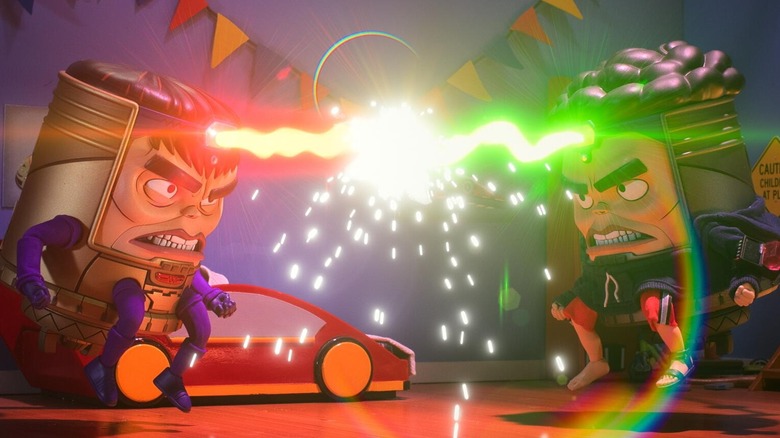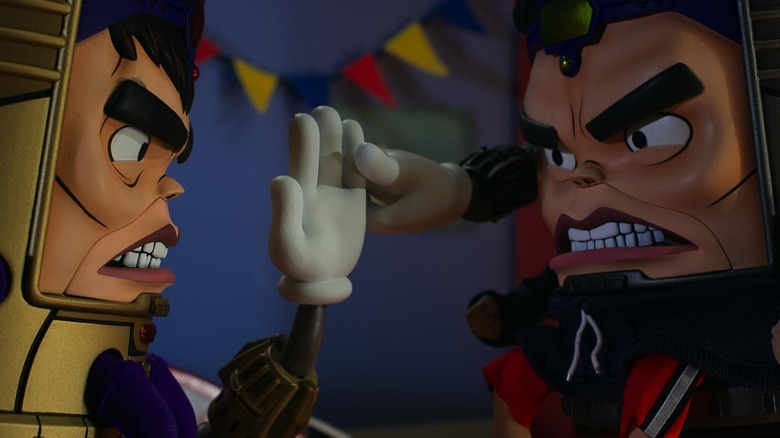The Ending Of Marvel's MODOK Explained
Contains spoilers for "Marvel's MODOK" on Hulu
If you're living your life right, you've already finished every episode of Jordan Blum and Patton Oswalt's Hulu series "Marvel's MODOK." Across 10 episodes, the show brings viewers into the life of the man described as comics' Most Iconic Mechanized Organism Designed Only for Killing, and draws the curtain back on his problematic approach to finding a work-life balance.
This take on MODOK is a reimagining far removed from his usual on-panel appearances. Sure, there's cackling and a healthy dose of super-science machinations, but villainy is presented less as an alien philosophy and more like the pursuits of a guy in his 40s who's still trying to make it as a stand up comedian. MODOK might have noble intentions — "I don't hate the world, I just want it to be better," he says — but they're rooted in the same delusion that turns otherwise capable adults into starry-eyed monuments to arrested development. His moral gradient is black and white: There are good people, like MODOK's mom, who told him that he was special. Everyone else falls into the same category as the bullies who beat him up. Their behavior will need to be corrected. It's a flailing, simplistic worldview, illustrated by MODOK's dramatic, all-or-nothing way of dealing with, well, literally everything.
Throughout the show's 10 episodes, MODOK takes the baby steps appropriate for a man of his head-to-leg ratio, thanks in large part to his forced reckoning with family life. Here's how "Marvel's MODOK" wraps up, and what it all means.
Time waits for no MODOK
As the series progresses, little by little, MODOK makes a gradual transition towards being a better father. He's still not great in the end, but he's okay. He dances with his son Lou (voiced by Ben Schwartz) at his bar mitzvah, acknowledges his shortcomings to his wife Jodie (Aimee Garcia), and even elicits a positive emotion from his daughter Melissa (Melissa Fumero), which is difficult when you're parenting any teenage girl, let alone one with a dominant supervillain gene.
But then, in a twist familiar to anyone who's ever received an invitation to a high school reunion and looked at themselves in the mirror on the same day, MODOK is haunted by the man he was 20 years ago. In this case, it's literal: the time-displaced MODOK from the past finds his present self and reminds him of what he wanted to be. Past-MODOK shows his older self all of the futures that could occur: deaths at the hands of every Avenger, toilet heart attacks, and, presciently, that one potential outcome that sees MODOK become the ruler of a utopian, unified Earth.
It's a setup that calls back to Doctor Strange's (Benedict Cumberbatch) "one chance in 14,000,065" scenario established in "Avengers: Infinity War" and fulfilled in "Avengers: Endgame," with one dark difference. Tony Stark (voiced by Jon Hamm in "MODOK") has to come to terms with how much of himself he'll sacrifice, while MODOK can succeed only if he sacrifices others — specifically, the family that he worked so hard to deserve. The key word there — the one that cemented the family's doom — is "worked."
Oh, the duality of MODOK
It's unavoidable that "Marvel's MODOK" is going to be compared to Adult Swim's "Rick and Morty," as they both have science fiction elements, pop culture references, and self-serving cartoon geniuses. Thus, there's no reason not to bring up a quote from "Rick and Morty" Season 3: "The thing about repairing, maintaining, and cleaning is, it's not an adventure. There's no way to do it so wrong you might die." That's the conundrum at the center of "MODOK": take the exciting, destructive, dramatic path, or keep working at the day-to-day aspects of his life — kill Iron Man, or clean your apartment.
One option means that MODOK's mother was right, and he's a very special boy. The other means doing the work, and, if his younger self is to be believed, never becoming what he dreamed he would be. Melissa's earlier attempts to teach her old man how to take the subtle, effective route echo through his decision, and MODOK stands at the same proverbial fork in the road as every dad that's ever thought about just getting in the car and driving away from it all, with the slight addendum of a dozen rockets being fired at his kids.
Then comes the flash forward: MODOK chose the first option. Like Doctor Horrible before him, MODOK has everything he's ever wanted, at the cost of the lives of the people he loved. Yes, he's keeping his younger self tethered to a torture device, using his chronocrystal facial bedazzling to look back on what he lost. But wanting his family back doesn't mean that he fixed the part of himself that threw them away to begin with. Untold years and a few dozen Avenger deaths later, and grand, dramatic gestures are still MODOK's only approach to problem-solving. Like the darkest possible iteration of Murphy Brown, MODOK declares that he will have it all.
How that'll pan out remains to be seen. Series co-creator Jordan Blum has hinted that a second season is already planned out, so fans should get excited for more "MODOK" misadventures in the (hopefully near) future.


